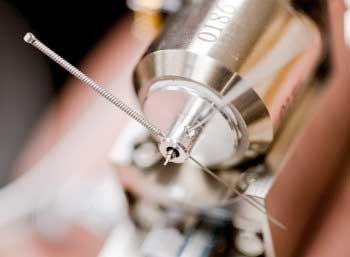Nanowerk May 29, 2018
Dendrites fill pre-existing microscopic flaws–grooves, pores and scratches at the interface between the lithium anode and the solid electrolyte separator increasing pressure on lithium. An international team of researchers (USA – Michigan Technological University, Oak Ridge National Laboratory, India) explored how the metal reacts to pressure. They provide a statistical model that explains the conditions under which lithium undergoes an abrupt transition that further facilitates its ability to alleviate pressure. They also provide a model that directly links the mechanical behavior of lithium to the performance of the battery… read more. Open Access TECHNICAL ARTICLE 1 , 2 , 3

The diamond-tipped probe Herbert and Hackney use for their research is incredibly sensitive and must be housed in a compartment that muffles any sort of vibrations. Image: Sarah Bird/Michigan Tech